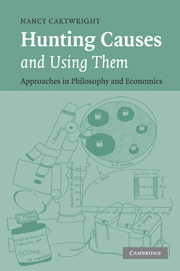Book contents
- Frontmatter
- Contents
- Acknowledgements
- Introduction
- Part I Plurality in causality
- Part II Case studies: Bayes nets and invariance theories
- 5 Preamble
- 6 What is wrong with Bayes nets?
- 7 Modularity: it can – and generally does – fail
- 8 Against modularity, the causal Markov condition and any link between the two: comments on Hausman and Woodward
- 9 From metaphysics to method: comments on manipulability and the causal Markov condition
- 10 Two theorems on invariance and causality
- Part III Causal theories in economics
- Bibliography
- Index
9 - From metaphysics to method: comments on manipulability and the causal Markov condition
Published online by Cambridge University Press: 03 December 2009
- Frontmatter
- Contents
- Acknowledgements
- Introduction
- Part I Plurality in causality
- Part II Case studies: Bayes nets and invariance theories
- 5 Preamble
- 6 What is wrong with Bayes nets?
- 7 Modularity: it can – and generally does – fail
- 8 Against modularity, the causal Markov condition and any link between the two: comments on Hausman and Woodward
- 9 From metaphysics to method: comments on manipulability and the causal Markov condition
- 10 Two theorems on invariance and causality
- Part III Causal theories in economics
- Bibliography
- Index
Summary
Introduction
Metaphysics and methodology should go hand in hand. Metaphysics tells us what something is; methodology, how to find out about it. Our methods must be justified by showing that they are indeed a good way to find out about the thing under study, given what it is. Conversely, if our metaphysical account does not tie in with our best methods for finding out, we should be suspicious of our metaphysics.
Daniel Hausman and James Woodward try to forge just such a connection in their work on causation. They claim that the central characterizing feature of causation has to do with manipulability and invariance under intervention. They then use this to defend the causal Markov condition (CMC), which is a key assumption in the powerful Bayes-nets methods for causal inference. In their own words, ‘the view that causes can in principle be used to control their effects lends support to the causal Markov condition’. This is an important project and, to my mind, a model of the kind of thing we should be trying to do. Their first attempt to prove a link between manipulability and CMC had a number of problems however. Unfortunately, so too does their latest attempt, ‘Modularity and the Causal Markov Condition’ (hereafter M&CMC).
Although the connection they picture is just the kind we need between metaphysics and method, this particular link is just not there.
- Type
- Chapter
- Information
- Hunting Causes and Using ThemApproaches in Philosophy and Economics, pp. 132 - 151Publisher: Cambridge University PressPrint publication year: 2007

